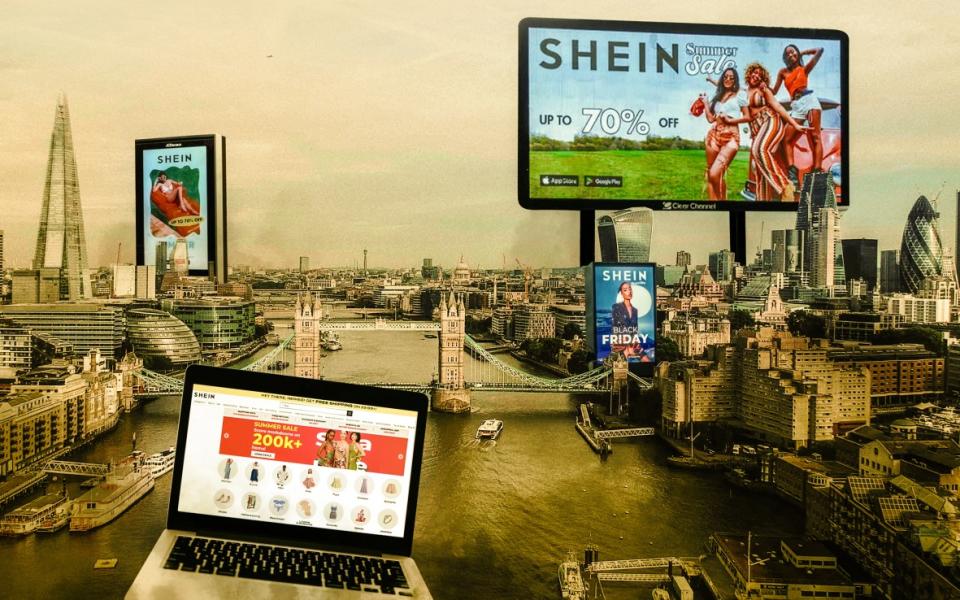Why the prospect of a Shein listing is dividing the City of London

Shein’s plans to reportedly float on the London Stock Exchange have been seen as a welcome boost in some quarters. But the Chinese founded fast-fashion giant is posing difficult questions for the City, writes Charlie Conchie
Just outside the metropolis of Guangzhou in Southern China sits Nancun, an area of some 130,000 people separated from the City by the sprawling tributaries of the Pearl River.
Guangzhou itself is a financial powerhouse in the Asia-Pacific region, hosting the offices of over 120 Fortune Global 500 companies and coming in 10th globally for the number of billionaire residents, according to a survey in 2020.
In Nancun, however, it is a different story. Since 2021 the district has been the centre of a firestorm for its role in the supply chain of Gen-Z outfitter Shein, where workers allegedly toil for long hours in grim conditions in the name of fast fashion.
A report from the advocacy group Public Eye in 2021 sounded the alarm on conditions in the district after finding that workers at six Shein suppliers were subject to punishing 75 hour weeks in factories with blocked corridors and stairways.
In response Shein said it has built an in-house team to monitor supply-chain partners. But a report last week raised fresh concerns over the facilities and methods used to produce the thousands of tonnes of cheap clothing that Shein ships around the world every year.
While it may seem a world away from the streets of London, that district is now causing a headache for the capital’s investors and public market reformers.

Shein is reportedly set to swap its listing plans from New York to London after facing a hostile response from lawmakers and regulators in the US. Alongside reports of gruelling conditions in Nancun, concerns were raised in the US over the firm’s alleged use of cotton from the province Xinjiang, where it’s estimated that 100,000 Uyghur detainees are forced to work in labour camps, as well as its data practices and ties to China.
The trade-off facing investors and the London Stock Exchange is now a sticky one: potentially kick-start an IPO revival by embracing a fast-fashion behemoth with a dubious human rights record, or stick to high-minded principles and miss out. Some down the river in Westminster are already sounding the alarm.
Concerns raised
“With Shein’s prices so low the London Stock Exchange needs to ask itself, whose suffering is subsiding those prices?,” Alicia Kearns, chair of the Foreign Affairs Select Committee and vocal anti-China campaigner, tells City A.M.
“With Shein’s prices so low the London Stock Exchange needs to ask itself, whose suffering is subsiding those prices?”
Alicia Kearns, chair of the Foreign Affairs Select Committee
“A company which has failed to make full disclosures about its supply chains as required by UK law, and where there are grave concerns about its factory working conditions has no place in London.”
After a five year-long push to beef up London’s ESG standards and green credentials, the environmental impact of Shein is similarly unsettling some corners of the City. Shein’s mammoth production rate has been a target of green groups since it burst onto the scene in the pandemic with a digital-first approach to marketing that cracked the global Gen-Z market.
Shein users (m)
According to the UN Environment Programme, the fast-fashion industry, of which Shein is one of the dominant players, is responsible for 10 per cent of global carbon emissions – more than all international flights and maritime shipping combined.
Shein notched record profits of more than $2bn in 2023 and around $45bn in gross merchandise value, the total value of products sold on its website. According to data from Cargo Facts Consulting, the firm ships around 5,000 tonnes of merchandise a day to the US alone, fuelling fears that Western shoppers are chucking mounting piles of disposable fashion onto the landfill.
“Shein’s LSE listing could be a major setback for ESG in the City,” says Sophie Kemp, an ESG partner at law firm Kingsley Napley. “Questions continue to be asked about its supply chain, environmental impact, corporate governance standards, as well as working conditions.”
London has some form in tweaking its rules in the hope of landing a big fish. Back in 2018, the Financial Conduct Authority was accused of watering down its governance standards in the hopes of winning the listing of Saudi Aramco, the world’s most profitable companies, which ultimately failed.
James Parkes, a corporate partner with law firm CMS, adds that while a Shein listing would be a boon to a market under the kosh, the float would come “with several potential challenges for the regulator and investors”.
A £50bn boost
However, a potential price tag north of £50bn could be a welcome bit of retail therapy for a market that has been plunged into the doldrums by a dearth of new IPOs. Listings on the London Stock Exchange fell to their lowest level since the financial crisis last year and City figures have been hoping for a watershed float to draw a line under the drought.
In a lightly coded call to the City Week Forum conference earlier this week, City minister Bim Afolami called for the City of London to be open to international firms, including those with ties to China.
“As China is concerned we are taking the long view. That is absolutely not the same thing as disengaging,” Afolami said.
“As China is concerned we are taking the long view. That is absolutely not the same thing as disengaging.”
City minister Bim Afolami
The former Chancellor Sajid Javid has also reportedly been in talks with Shein’s executive director Donald Tang over a potential role with the firm. Shein has also been working with top City PR firm Brunswick for over a year and has appointed a new corporate communications team to help it win round the press in London and shrug off accusations of secrecy.
The support from politically aligned players would be a boon to the firm as it grapples with the arguably more troubling fears surrounding its IPO: the belief it’s still in thrall to China.
Although Shein swapped its headquarters to Singapore in 2022 and makes all of its cash outside the country, the firm was founded in the Chinese city of Nanjing and still employed some 10,400 in the country at the end of 2022, according to data provider Tianyancha, reported by the Financial Times. Just 200 staff meanwhile are based in Singapore.
Despite shifting its headquarters to Singapore, Shein has also asked the Chinese securities regulator for approval to list overseas, a request that is likely to be waved through, according to reports.
The perception it is controlled from China triggered a wave of hostility in the US and sparked a probe from the House Select Committee on the Chinese Communist Party over its data privacy practices.
Tang told the Financial Times last week that the firm had “made progress” in shooting down the belief it was a Chinese firm but not enough to win them over. Some now fear that London is at risk of opening its arms to the company while questions still hang over its cosiness with the country in which it was founded.
“The Chinese Communist Party wants to weaken and divide democratic alliances,” Luke de Pulford of the China pressure group, the Inter-Parliamentary Alliance on China, tells City A.M..
“Allowing Shein to list in London when the US has explicitly refused does the work of the CCP for them.”
“Allowing Shein to list in London when the US has explicitly refused does the work of the CCP for them.”
Luke de Pulford of the China pressure group, the Inter-Parliamentary Alliance on China
The London Stock Exchange declined to comment.
Shein Revenue ($bn)
For all the furore, many are simply thankful for the signs of a bumper float in London.
Taken alongside plans from the computer-maker Raspberry Pi last week and a gangbuster couple of weeks for the FTSE 100, Shein’s reported plans have lifted hopes of a revival in the City.
Earlier this week, London Stock Exchange chief Julia Hoggett claimed the “public narrative” was shifting after a year and a half of gloom, and the IPO of a globally recognised name has the potential to kick the City’s shuttered IPO window back open.
“Shein is such a big name in the world of retail that its mere presence on the London market could encourage others to look hard at the UK as a listing venue,” says Dan Coatsworth, an investment analyst at AJ Bell.
For its part, Shein says it has a “zero-tolerance policy for forced labour” and is “committed to respecting human rights”.
“We take visibility across our entire supply chain seriously and we require our contract manufacturers to only source cotton from approved regions,” the firm told City A.M. in a statement.
Alongside that it says it is tackling environmental issues by using its “expertise and resources to help deliver tangible, positive outcomes that tackle waste, increase circularity and circular product development”. It has also repeatedly dismissed suggestions it is still aligned with China.
Public Eye itself, which raised concerns over Shein’s manufacturing centres, told City A.M. it does not recommend boycotts but hopes the LSE “will also take the social and environmental sustainability of Shein’s business model into account”.
For all Shein’s efforts to address the reputational issues around its business, the question still remains for the City: will Shein give the London Stock Exchange a glitzy makeover or show that its dressy high standards were ultimately disposable?

 Yahoo Finance
Yahoo Finance 